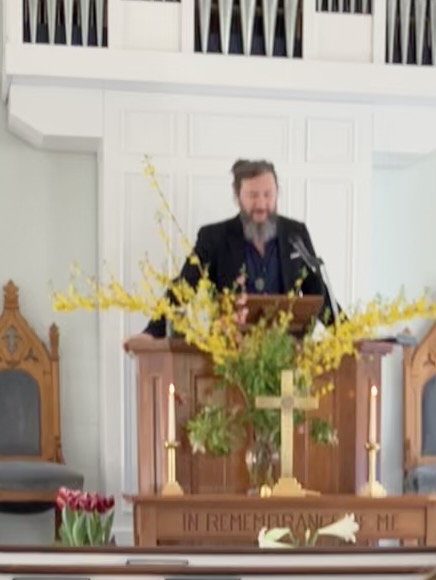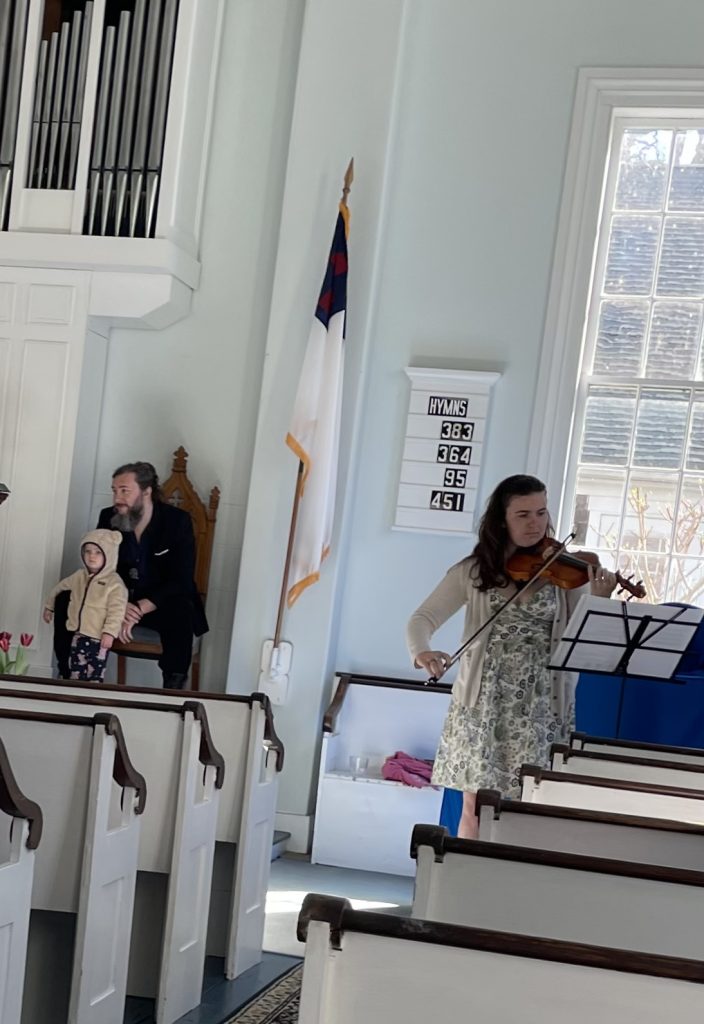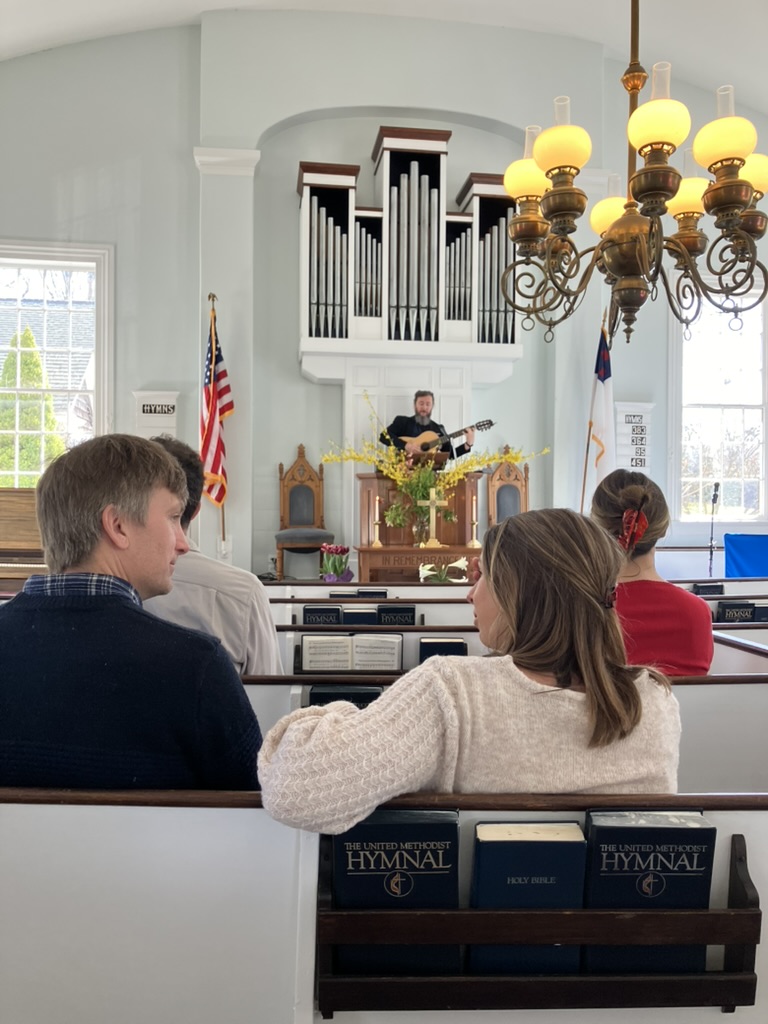
It was another special Sunday. With Rev. Stoddard on vacation, Sean McMahon, music minister, preached and played the hymns while Violet Southwick played prelude, interlude and postlude on her violin, a medley of Irish tunes.

Sean’s sermon is below:
Responsive Reading:
2 Tim. 2:11-13. This is a trustworthy saying: If we died with Him, we will also live with Him; if we endure, we will also reign with Him; if we deny Him,He will also deny us; if we are faithless, He remains faithful, for He cannot deny Himself.
Reading:
Eph. 5:11-14. Have no fellowship with the fruitless deeds of darkness, but rather expose them. For it is shameful even to mention what the disobedient do in secret. But everything exposed by the light becomes visible, for everything that is illuminated becomes a light itself. So it is said: “Wake up, O sleeper, rise up from the dead, and Christ will shine on you.”
Sermon
Have you ever soiled yourself in school?
I have. On purpose! My first day of preschool. I was devastated that my mother abandoned me in this prison full of strangers and structure. I hated it. All exits were blocked and my options were limited. But inspiration struck. Maybe if I soiled myself, my mom would have to come get me. It was, after all, her responsibility to do such things. So I went off to a corner to do my business, and I wet myself.
Right on cue, I was discovered. My new teacher, Mrs. Sylvia, took me to a back room, away from all the kids, to call my mom no doubt. Surely I was on my way home! Until…
She knelt down, reached into a cabinet, and pulled out a fresh pair of pants for me. A pair of my own pants from home! She quickly and gently changed my clothes, and then sent me back to the classroom to be with the other kids. They never knew the better. But I was scarred by the ordeal. I felt betrayed – what sort of mother conspires with her son’s prison guards to such a degree that she gives them pants to prevent a pee-pants jailbreak? How sick and twisted of them to corner me with such a conspiracy!
I was also ashamed. The fact that they had a pair of my own pants signaled their lack of faith in my continence. I was fully potty trained, but I’d inadvertently set myself back to pants-peer status with my covert ploy. I was mortified.
Then again, Mrs. Sylvia never exposed me to ridicule. At the first sign of incontinence, she whisked me away, changed me, and sent me back to the classroom so discreetly the other kids never knew what had happened.
My friends, in this story, we are the pants-peers. God the Father is my mom. Mrs. Sylvia is the Holy Spirit. They conspired together and sent the fresh pair of pants, the Son, for scripture tells us in many places (Rom. 13:14, Gal. 3:27, Eph. 4:24, Col. 3:10 and more) that we are clothed with Christ.
This is all to the end that we would not be put to shame.
No doubt, the idea that the Trinity would conspire in this way out of love for us might not scream “betrayal” the way I felt betrayed by my mom and teacher — and yet, how many times have we felt betrayed by God? How many times have we screamed, “Why God, why?” Why the setbacks? Why the suffering? You made this world to be this way. People are hurting. I’m hurting. Heck, I might even be hurting myself on purpose out of spite, or worse, desperation. Lashing out. Giving up.
The sense of betrayal at the heart of the Gospel is suffering. Don’t get me wrong: the Gospel, the Good News of Jesus Christ, is our hope. But here’s the rub: scripture says that your hope of glory is “Christ in you.” (Col. 1:27). Hence the sense of betrayal: Christ suffered. That means, we share not just in his glory, but his suffering. St. John taught that when Christ appears in us, we will be like him – he who was pierced for our transgressions; who was crushed for our iniquities; who was punished that we might have peace; was striped by wounds – could you imagine being wounded so many times by lashing that you look striped, like a zebra? — that we might be healed; who was oppressed and afflicted – but wait, there’s more! — who was led like a lamb to the slaughter for our sakes. (Is. 53).
Our hope of glory is in imitation of Jesus, who endured all of this. Some might call that a bait and switch — if not for the hope of the resurrection. For he was submerged by our sin, but it did not drown him; he was chained by our iniquities, but the chains could not overcome him; the hellfire of our unquenchable appetites for destruction did not devour him, nor did it destroy him. No. Rather, he arose victorious over the unmatchable weight of our shame, and laughed at it: he put shame to shame.
There is a host of powers and authorities out there that wield shame as a weapon. Jesus Christ disarmed them, and “made a public spectacle of them, triumphing over them by the cross.” (Col. 2:15).
This glorious fact, paradoxically, can cause us shame. It means he judged our own sense of righteousness – that is, self-righteousness – as an embarrassment for which he had to die. So that he could cover for us — even cover us, as in clothe us, with the glory of his resurrection righteousness. Our righteousness, by comparison, is a filthy rag according to scripture (Is. 64:6).
The answer to this isn’t “Why bother? Eat drink and merry, for tomorrow we die.” Rather, the answer is humility in love: we accept that we do not have the high ground, and the reason for this is that God has, in his love for all, made low every mountain; raised every valley; leveled the rough ground, and turned the rugged hills into a plain. These are biblical images for people and their status. We’re all reconciled in his humble love. He made it impossible for us to truly say to one another, “God damn you.” For Christ’s blood stands firm between all of those words even as his words stood firmly between the woman caught in adultery and those who wished to stone her. “Let the one without sin cast the first stone.” No one hurled another word, let alone a stone.
Christ did not come to condemn us, as the woman’s accusers condemned her; but to save us, as he saved her. “Who is there to damn us? For Christ Jesus, who died, and more than that was raised to life, is at the right hand of God—and He is interceding for us. Who shall separate us from the love of Christ? Shall trouble or distress or persecution or famine or nakedness or danger or sword?…neither death nor life, neither angels nor principalities, neither the present nor the future, nor any powers, neither height nor depth, nor anything else in all creation, will be able to separate us from the love of God that is in Christ Jesus our Lord.” (Rom. 8:34f).
Even when we open our closets to hang a new skeleton, his blood testifies of his infinite love and forgiveness. I want to clarify what it means to fall from grace, since we have often heard that one falls from grace when they commit the sins. You know the sins: Lust, Gluttony, Greed, Sloth, Wrath, Envy, Pride. Oh yes, these are certainly the sins. And we certainly ought to avoid them, for if we don’t, our imitation of Christ will be as feckless as a tonedeaf Elvis impersonator.
But scripture does not define falling from grace as “doing the sins”. Rather, it says: “You who are trying to be justified by the law have been alienated from Christ; you have fallen away from grace.” (Gal. 5:4). Now he was speaking specifically here about the Law of Moses, but Paul elsewhere says that every nation and culture has its own like laws, customs, and norms – that would therefore include our own. What he is saying to us, then, is that if we live in such a way as to measure one another by some such standard or another, we will fall from grace, and live in shame. Living in shame – both shaming and being ashamed – we have fallen from grace, and spurned the blood of forgiveness.
This is very, very good news. Paul says it is shameful to even mention what the disobedient do in secret. We are liberated from even shaming the enemies of grace — the shamers! “Have no fellowship with the fruitless deeds of darkness, but rather expose them.” What does he mean by this? I thought it was shameful to even mention it, so why expose it? He doesn’t mean expose it for ridicule and shame, since that’s what he calls “fruitless darkness” — but expose it to the light of Christ.
That’s why the ancient church sang, “Wake up, O sleeper, rise up from the dead, and Christ will shine on you.” This is a mystical, lyrical way of saying: reveal God’s forgiveness to even the shamers, just as Jesus revealed it to those shamers who went so far as to shame him to death: “Father forgive them, they know not what they do.” In revealing God’s forgiveness to all, especially those who need it the most due to the weight of their sins, we don’t just shine the light of Christ on others, but we rouse ourselves from sleep and death, and the glory of Christ rests luminously on us like garments of light. That’s the power of mercy. It’s the powerful, God-breathed antidote to shame.
Shame, whether internalized or projected onto others, is taken very seriously in the New Testament. It is a profoundly fallen state, illustrated by terms like “darkness, sleep, drunkenness,” etc — even “death”. Listen to this passage from 1 Thess. 5. When he is talking about light and darkness, he’s talking about mercy and shame:
“But you, brothers [and sisters], are not in the darkness…you are all children of the light and sons of the day; we do not belong to the night or to the darkness. So then, let us not sleep as the others do, but let us remain awake and sober. For those who sleep, sleep at night, and those who get drunk, get drunk at night. But since we belong to the day, let us be sober, putting on the breastplate of faith and love, and the helmet of our hope of salvation.” (1 Thess. 5:4-8). It can be confusing if you don’t know that he’s using light vs. darkness to talk about mercy vs. shame. But the Spirit of God, inspiring these scriptures, uses such profoundly primal concepts as light and darkness, life and death, to speak of mercy and shame, because that’s how serious this spiritual matter is.
The New Testament takes shame seriously because God takes it seriously. He neither wants us to be ashamed, nor to be shamers. He sent His son to die under the weight of everyone’s shame so that, in raising Him from the dead, he might very publicly put shame to shame, demonstrating its impotence once and for all.
In a world full of self-righteous shamers on the left and the right, whether “woke” or “based”, as the lingos of today’s fashions go, no one is redeemable. Everyone is “selected to be exposed,” “doxxed,” “called out,” “destroyed,” etc – these are all slang for targeted internet harassment in the name of justice. There’s more, I Googled it: dogpilling, astroturfing, brigading, concern trolling, lollipopping, ragefarming, swatting, shame mobbing. We’ve come a long way from the stocks and the pillories…or have we? Where is the grace in this type of world?
This is the world we’re in, but we must not be of it, lest we fall back asleep. Just as many of those whom Moses led out of Egypt turned back to their oppressors in their hearts, so also, we read that even some of those who were eyewitnesses of the glory of the risen Christ fell back asleep (1 Cor. 15:6). Such is human nature that we are fully capable of turning away from forgiveness and grace, such as in the parable of the Unforgiving Debtor (whose debts were forgiven, but he refused to forgive the debts of others). That’s falling from grace.
We are fully capable of beholding the miraculous light of Jesus Christ Himself, let alone the light of all those wonderful miracles with which he fills our lives every day if we just look around and appreciate them – we can bask in all this eternal light one moment, and just fall asleep the next.
But don’t let this discourage you. This is exactly why Our Lord emptied himself. “He died for us so that, whether we are awake or asleep, we may live together with Him. Therefore encourage and build one another up, just as you are already doing.” (1 Thess. 4:10-11).
Now, just in case you didn’t find enough encouragement from my pants-peeing story, I have yet more I want to leave with you. The late Fr. Brendan Manning spoke in persona Christi when he shared just this beautiful encouragement: “I know your whole life story. I know every skeleton in your closet. I know every moment of sin, shame, dishonesty and degraded love that has darkened your past. Right now I know your shallow faith, your feeble prayer life, your inconsistent discipleship. And my word is this: I dare you to trust that I love you just as you are, and not as you should be. Because you’re never going to be as you should be.”
My friends, this is the mystery of death and resurrection.
“Wake up, O sleeper, rise up from the dead, and Christ will shine on you.”
Amen.
